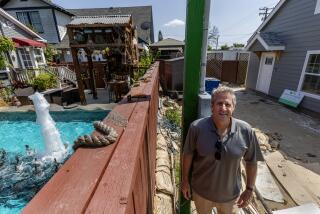It’s open season on private property
- Share via
Supreme court Justice David Souter must be ruing the day he joined the majority opinion in Kelo vs. City of New London, the controversial case that approved the Connecticut city’s plan to redevelop its waterfront by seizing homes and handing them over to private developers. Under the Constitution, governments may not take private property except for “public use,” but in Kelo, the court held that the concept of “public use” is capacious enough to embrace private economic development, as long as it is in the public interest.
Libertarians denounced the decision as the death knell for private-property rights. It’s outrageous, they argued, that government should be allowed to take houses away from their owners so that developers can build shopping malls and football stadiums. And in Souter’s home state of New Hampshire -- where the license plate motto is “Live Free or Die” -- some critics of the Kelo decision are taking creative revenge. They’ve proposed to local zoning boards that Souter’s 200-year-old farmhouse in Weare, N.H., be seized and turned into a luxury hotel to bring “economic development and higher tax revenue” to the town.
The plan has a certain appeal. Frankly, in its current form, Souter’s farmhouse offers little benefit to the general public. I passed through Weare one time myself, and Justice Souter did not invite me in. I call that selfish. Besides, Weare’s not exactly chock full of tourist amenities. What would be so wrong with adding a luxury hotel?
I’m not a libertarian, so I have long indulged in redistributive fantasies. If we can take away welfare benefits from poor people who don’t work and hand over parkland to oil companies, why shouldn’t we take private property from others as well?
Is there any reason not to turn the White House into a multicultural food court? Surely that would do more for the public interest than letting the current occupants have free run of the place.
There are plenty of examples of private property that would better serve the public interest if they were, well, somebody else’s private property. If they were mine, for instance. I’m writing this column in a very nice, rented vacation house on Cape Cod, which I’d like to buy, but our landlady appears not to want to sell. Is that fair?
And back at home, there’s this tacky McMansion that sprung up down the road, made doubly irritating by the inane political signs planted out front, such as “Let’s Roll!” (on the eve of the Iraq war) and “Protect the Sanctity of Marriage!” Meanwhile, the rural town I share with these bozos lacks a single Starbucks. I say, why not just move those people out of their enormous house and move the Starbucks in. What’s more important here, free expression or expensive lattes?
Since the court’s decision in Kelo, I’m not the only one who’s been engaging in creative “takings” fantasies. Developers are salivating at the thought of all the profitable real estate they may now be able to snatch up with a little help from their pals on the city council.
In Freeport, Texas, it took town officials only a few hours from the time Kelo was handed down to file papers seeking the seizure of two local seafood companies; they want to turn the land into a private boat marina. In Long Branch, N.J., residents are fighting town efforts to boot them out of their waterfront homes so a developer can build luxury condos instead.
We’ll probably see plenty of similarly dubious development plans in the wake of Kelo. In her dissenting opinion, Justice Sandra Day O’Connor predicts a free-for-all: “Nothing is to prevent the state from replacing ... any home with a shopping mall, or any farm with a factory ... and the beneficiaries are likely to be those citizens with disproportionate influence and power ... including large corporations and development firms.” O’Connor’s fears are legitimate, although she overstates the case. The majority opinion in Kelo followed existing precedent and merely acknowledged reality: In today’s world, where public and private are often inextricably entangled, there is “no principled way of distinguishing economic development from the other public purposes” (such as building a new road or installing electrical lines) that the court has long recognized as sufficient to justify government takings of private property.
What it comes down to is that each case will have to be decided on its own particulars. In New London, the waterfront revitalization plan at issue was developed through a transparent and participatory process, and it may well be the struggling city’s last hope. But other development projects might not pass muster in the courts. And it’s hardly true that “nothing” can now prevent a free-for-all: Reacting to Kelo, many state legislatures are already considering tighter laws to ensure that the power of eminent domain is not abused.
In the meantime, while it’s still open season on private property, I’ve got my eye on the Bush ranch in Crawford, Texas. Wouldn’t it make a lovely a nuclear waste dump?
More to Read
Sign up for Essential California
The most important California stories and recommendations in your inbox every morning.
You may occasionally receive promotional content from the Los Angeles Times.













